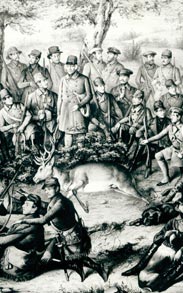The university's history
The university's history began in Berlin. The first Prussian Minister for Forests, Georg von Hagen, advised Friedrich II (1712 - 1786) that a forest academy should be established in Berlin. It would be a research institute located outside of the university and would also provide instruction in forest management. The reason for the establishment of the institute was that Prussia's forests were in a catastrophic state. They were used without regulation or management and were not systematically rejuvenated. Pigs, cows and other animals browsed in the woods and ate all the young tree shoots. The numerous glass works in the region burned large volumes of wood for glass melting.
Regulated forest management and formal forestry education did not begin, however, until 1811 when Georg Ludwig Hartig was appointed privy counsellor and chief inspector of forests in Berlin. One of Hartig's demands was that "Every wise forest authority must ... use the state's forest ... in such a way ... that our descendants can obtain at least as much gain from them as today's generation does". Thus, the notion of sustainability was formulated by a Prussian official. As is becoming increasingly clear to us today, without sustainable management, it is possible to deal with the future challenges facing the human race.
In 1821, Hartig appointed Friedrich Wilhelm Pfeil (1783 - 1859) as director of the Königliche Forstakademie zu Berlin (Royal Academy of Forestry Berlin) which was a special institute of Berlin's Friedrich-Wilhelm University. That same year Pfeil was made an honorary doctor of the faculty of philosophy by Georg Wilhelm Friedrich Hegel.
In his inaugural lecture as director of the Academy of Forestry, Pfeil pointed out that the "scientific training of foresters" is an indispensable precondition "of the enhancement of national prosperity and the well-being of the people." However, Pfeil also believed that a smaller location close to a forest would be a better place for a forestry academy than the metropolis of Berlin. Alexander and Wilhelm von Humboldt supported this point of view as did Hartig, the chief inspector of forests. Thus the Prussian Cabinet issued an order on March 27, 1830, stating that the Academy of Forestry be relocated to the city of Eberswalde between Schorfheide and Barnim, and Pfeil was appointed as its first director.
"If of the forest we take care
In the benefits all will share"
